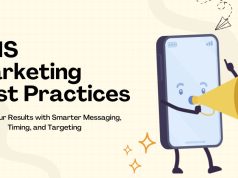SMS marketing software represents the technological backbone that enables businesses to harness the power of text messaging for marketing purposes. While SMS marketing itself boasts impressive statistics—like 98% open rates and response times under three minutes—the software that powers these campaigns determines their success or failure.
Understanding SMS marketing software is crucial for businesses looking to implement effective text message marketing campaigns. This comprehensive guide explores what SMS marketing software is, how it works, its essential features, and how to choose the right platform for your business needs.
Understanding SMS Marketing Software
SMS marketing software is a specialized platform that enables businesses to send promotional messages, alerts, and updates to customers’ mobile phones via text messages. These platforms serve as the bridge between businesses and their customers, providing the infrastructure needed to create, send, and track text message campaigns.
Unlike basic texting apps on your phone, SMS marketing software offers advanced features designed for business use. These platforms handle everything from contact management and message scheduling to compliance monitoring and performance analytics.
The software operates on a subscription-based model, where businesses pay based on the number of messages sent or contacts stored. This scalable approach makes SMS marketing accessible to businesses of all sizes, from small startups to large enterprises.
Core Features of SMS Marketing Software
Contact Management and Segmentation
Professional SMS marketing software provides robust contact management capabilities. Users can import contacts from various sources, organize them into segments based on demographics or behavior, and maintain clean, up-to-date lists.
Segmentation features allow businesses to send targeted messages to specific groups. For example, a retail store might send different messages to VIP customers versus first-time buyers, improving relevance and engagement rates.
Message Creation and Templates
Most platforms offer user-friendly message creation tools with pre-built templates for common campaign types. These templates help businesses craft professional messages quickly while ensuring they stay within the 160-character limit.
Advanced platforms include dynamic content features that automatically personalize messages with customer names, purchase history, or location-specific information.
Automation and Scheduling
SMS marketing software enables businesses to automate their messaging campaigns. Users can set up triggered messages based on customer actions, such as welcome messages for new subscribers or abandoned cart reminders for e-commerce customers.
Scheduling features allow businesses to plan campaigns in advance and send messages at optimal times for maximum engagement.
Two-Way Messaging
Modern SMS marketing platforms support two-way conversations, allowing customers to respond to messages and engage in real-time communication with businesses. This feature is particularly valuable for customer service and engagement campaigns.
Analytics and Reporting
Comprehensive analytics help businesses track campaign performance through metrics like delivery rates, open rates, click-through rates, and conversion rates. These insights enable data-driven optimization of future campaigns.
Advanced platforms provide detailed reports on customer behavior, campaign ROI, and list growth metrics.
Compliance Management
SMS marketing software includes built-in compliance features to help businesses adhere to regulations like TCPA in the United States. These features manage opt-in confirmations, maintain consent records, and ensure proper opt-out handling.
How SMS Marketing Software Works

Message Routing and Delivery
SMS marketing software connects to cellular networks through specialized gateways that ensure reliable message delivery. When you send a campaign, the software routes messages through these networks to reach recipients’ phones.
The software monitors delivery status and provides real-time feedback on message success rates. Failed messages are automatically flagged for review or retry.
Integration Capabilities
Professional SMS marketing platforms integrate with other business tools like Customer Relationship Management (CRM) systems, email marketing platforms, and e-commerce solutions. These integrations enable seamless data flow and coordinated marketing campaigns across channels.
For example, when a customer makes a purchase through your website, the SMS software can automatically send a confirmation message and add the customer to a post-purchase follow-up sequence.
API and Webhook Support
Advanced SMS marketing software provides Application Programming Interface (API) access, allowing businesses to build custom integrations and automated workflows. Developers can use these APIs to trigger messages from other applications or sync data between systems.
Webhooks enable real-time data updates, ensuring that customer information and campaign results stay synchronized across all platforms.
Types of SMS Marketing Software
Cloud-Based Platforms
Most modern SMS marketing software operates in the cloud, offering easy access from any device with internet connectivity. These platforms handle all technical infrastructure, providing reliable service without requiring on-premise hardware.
Cloud-based solutions typically offer better scalability, automatic updates, and lower upfront costs compared to on-premise alternatives.
Enterprise Solutions
Large organizations often require enterprise-grade SMS marketing software with advanced security features, custom integrations, and dedicated support. These solutions typically offer higher message volumes, priority routing, and specialized compliance features.
Industry-Specific Platforms
Some SMS marketing software is designed for specific industries like healthcare, retail, or real estate. These platforms include industry-specific templates, compliance features, and integration capabilities tailored to particular business needs.
Choosing the Right SMS Marketing Software

Evaluate Your Business Needs
Before selecting SMS marketing software, assess your specific requirements. Consider factors like expected message volume, integration needs, budget constraints, and required features.
Small businesses might prioritize ease of use and affordability, while larger organizations may need advanced automation and enterprise-grade security.
Consider Scalability
Choose software that can grow with your business. Look for platforms that offer flexible pricing tiers and can handle increased message volumes as your subscriber list expands.
Review Integration Options
Ensure the SMS marketing software integrates with your existing business tools. Common integrations include CRM systems, email marketing platforms, e-commerce solutions, and social media management tools.
Assess Support and Training
Quality customer support becomes crucial when managing time-sensitive SMS campaigns. Look for providers that offer comprehensive support through multiple channels and provide training resources to help your team succeed.
Compare Pricing Models
SMS marketing software typically charges based on message volume, contact storage, or feature access. Compare pricing structures to find the most cost-effective option for your usage patterns.
Implementation Best Practices
Start with Clear Objectives
Define specific goals for your SMS marketing campaigns before implementing software. Whether you’re focused on sales, customer service, or engagement, clear objectives will guide your platform selection and campaign strategy.
Build Quality Contact Lists
Focus on building permission-based contact lists with engaged subscribers. Quality matters more than quantity in SMS marketing, and reputable software will help you maintain compliance and list hygiene.
Develop Message Templates
Create a library of message templates for common campaign types. This preparation enables quick campaign deployment and ensures consistent brand messaging across all communications.
Test and Optimize
Use your SMS marketing software’s testing features to experiment with different message formats, timing, and calls-to-action. Regular testing and optimization lead to improved campaign performance over time.
Common Implementation Challenges
Compliance Complexity
SMS marketing regulations vary by location and industry. Choose software that simplifies compliance management and provides clear guidance on regulatory requirements.
Message Deliverability
Not all SMS marketing software offers the same delivery reliability. Research providers’ network partnerships and delivery rates to ensure your messages reach recipients consistently.
Integration Difficulties
Some businesses struggle with integrating SMS marketing software into their existing technology stack. Plan for integration requirements early and consider working with providers that offer implementation support.
The Future of SMS Marketing Software
Artificial Intelligence Integration
AI-powered features are becoming standard in SMS marketing software. These capabilities include predictive send-time optimization, automated content personalization, and intelligent customer segmentation.
Rich Communication Services (RCS)
RCS technology promises to enhance SMS marketing with rich media capabilities, interactive elements, and improved delivery tracking. Forward-thinking software providers are already incorporating RCS support into their platforms.
Enhanced Analytics
Next-generation SMS marketing software will provide deeper insights into customer behavior, campaign performance, and ROI attribution. These analytics will enable more sophisticated campaign optimization and business intelligence.
Maximizing Your SMS Marketing Investment

SMS marketing software represents a powerful tool for businesses seeking direct, immediate communication with their customers. The key to success lies in choosing the right platform for your specific needs and implementing it strategically.
Start by clearly defining your objectives and evaluating potential platforms based on features, scalability, and support quality. Focus on building engaged subscriber lists and creating valuable, relevant content that respects your customers’ time and attention.
Remember that SMS marketing software is just a tool—its effectiveness depends on your strategy, content quality, and commitment to providing value to your subscribers. With the right approach and platform, SMS marketing can become one of your most effective customer communication channels.
The investment in quality SMS marketing software pays dividends through improved customer engagement, increased sales, and stronger customer relationships. As mobile communication continues to evolve, businesses that master SMS marketing today will be well-positioned for future success.
While SMS marketing software helps brands deliver timely and personalized messages to their audience, it’s also worth exploring how virtual event sponsorship strategies can complement these efforts by increasing brand visibility and engagement in online settings.









